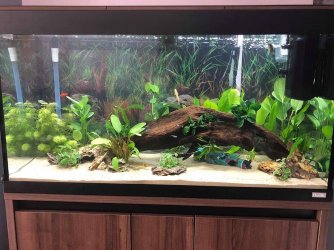Sorry, but that's a vast oversimplification of the process.
Again so is this.
A faster, filter gets more water through your filter media quicker and in the case of detritus, it will be filtered from the water much quicker than another filter with a slower flow rate. Slower flow rates mean harmful waste is in your aquarium longer. Too slow and your biological bacteria could end up chucking out harmful toxins.
Out of sight, out of mind?! Detritus in the filter is still in the aquarium system...decomposing and polluting the water. Fast water flows actually reduce the efficiency of nitrosomonas and nitrospira/nitrobacter to process ammonia and nitrites into nitrates.
So by this logic we can get rid of filters completely and change tank water on a daily basis then? Not cleaning the filter regularly means the beneficial bacteria have longer to build up and in greater numbers. Cleaning all that "crud" out also will remove some of this beneficial bacteria that is building up. That's why people leave their filters for longer.
Well most hobbyists have a problem with mulm even though like algae, it's pretty natural, Again, filters don't clean water, they just move particulates where we don't see them so the water looks good. Given good conditions of food and O2, beneficial bacteria can double their numbers in about 24 hours! And it's another myth that bacteria only lives in a filter - there's far more BB in the rest of the tank, especially the substrate!
There are huge fish rooms and breeder operations that run on air driven sponge filters...where water purity is based on routine partial water changes. Since filters can't make water more pure, the same is true in the home aquarium.
I would strongly disagree with this comment. I've seen a tank look crystal clear yet a number of fish died becuase nitrites and ammonia were at dangerous levels due to the filter not being matured.. The filter was doing its job to make the water clear but that's only half the story...
I guess you could think that, but then the tank/filter was not cycled. In an established tank you can totally (properly) clean a filter with no harm to livestock. I run all of my filters with foam/bio-sponge material and clean the sponges everytime I service the filters (at least weekly) without issue.
Its also worth remembering that many fish like increased flows and are much happier with faster moving water in an aquarium. Also, the faster the flow, the more the water moves around in the aquarium reducing dead spots which can reduce certain types of algae, plus it also helps the nutrients get to your plants (if you have them) more efficiently.
You can have good circulation without fast filter flows. Although there are some rare wild caught river dwelling fish that would prefer fast(er) moving water, these are an exception, rather than a rule. Most of the fish we see in the hobby are pond or tank bred and raised and never saw fast water. To have them live in a torrent of fast moving water because their wild cousins do just makes little sense.
It should also be noted that you can have too much flow in certain circumstances so like everything, its vital to get a balance. The type of filtration you are using will also have a bearing on this as well as the size of the tank.
We can agree on this.
Not long ago, on a FB fish forum, a proud member was displaying his 55g tank with three(3) large Sunsun canister filters underneath. I created a firestorm when I suggested he was over-filtering. He had come to believe that "There's no such thing as too much filtration". But in fact, there is! And frankly, I'll bet like many hobbyists, these filters were only serviced infrequently so all the 'stuff' stays in the system, polluting the water! A problem with water that looks clear is some think they can put off partial water changes. Fresh water in the aquarium only stays fresh when it's routinely renewed..."The solution to pollution is dilution".
I've been in the hobby since about 1965 - there are many misconceptions that keep getting repeated.


